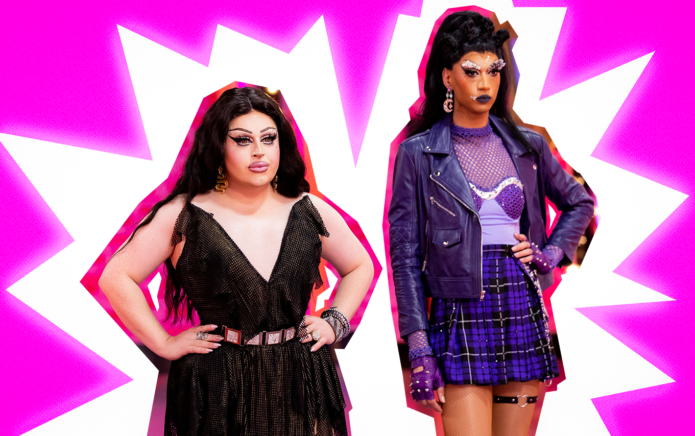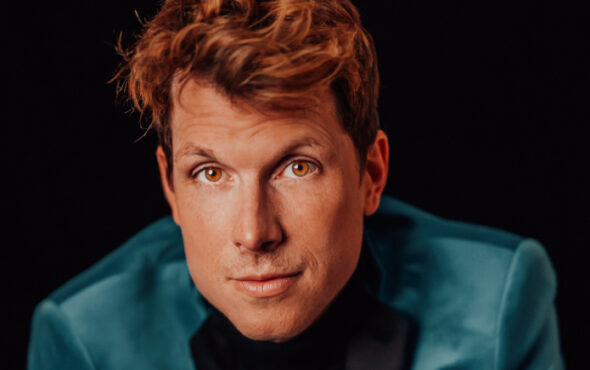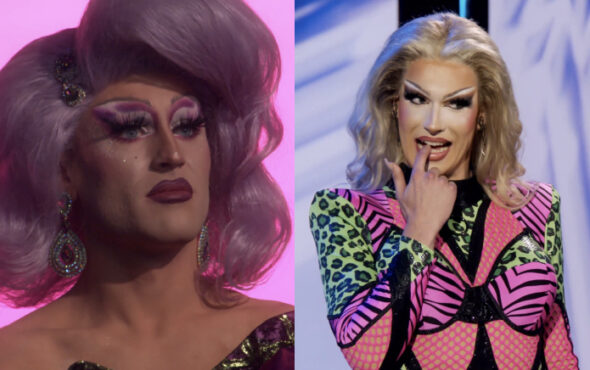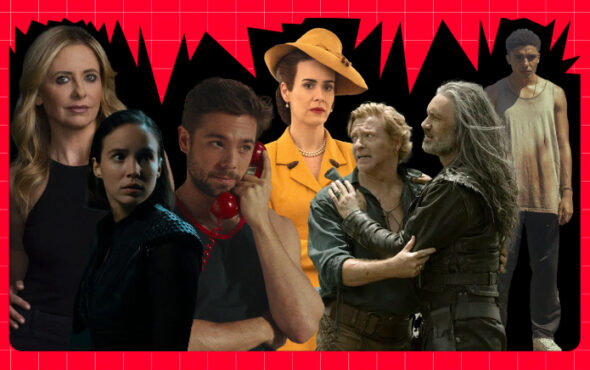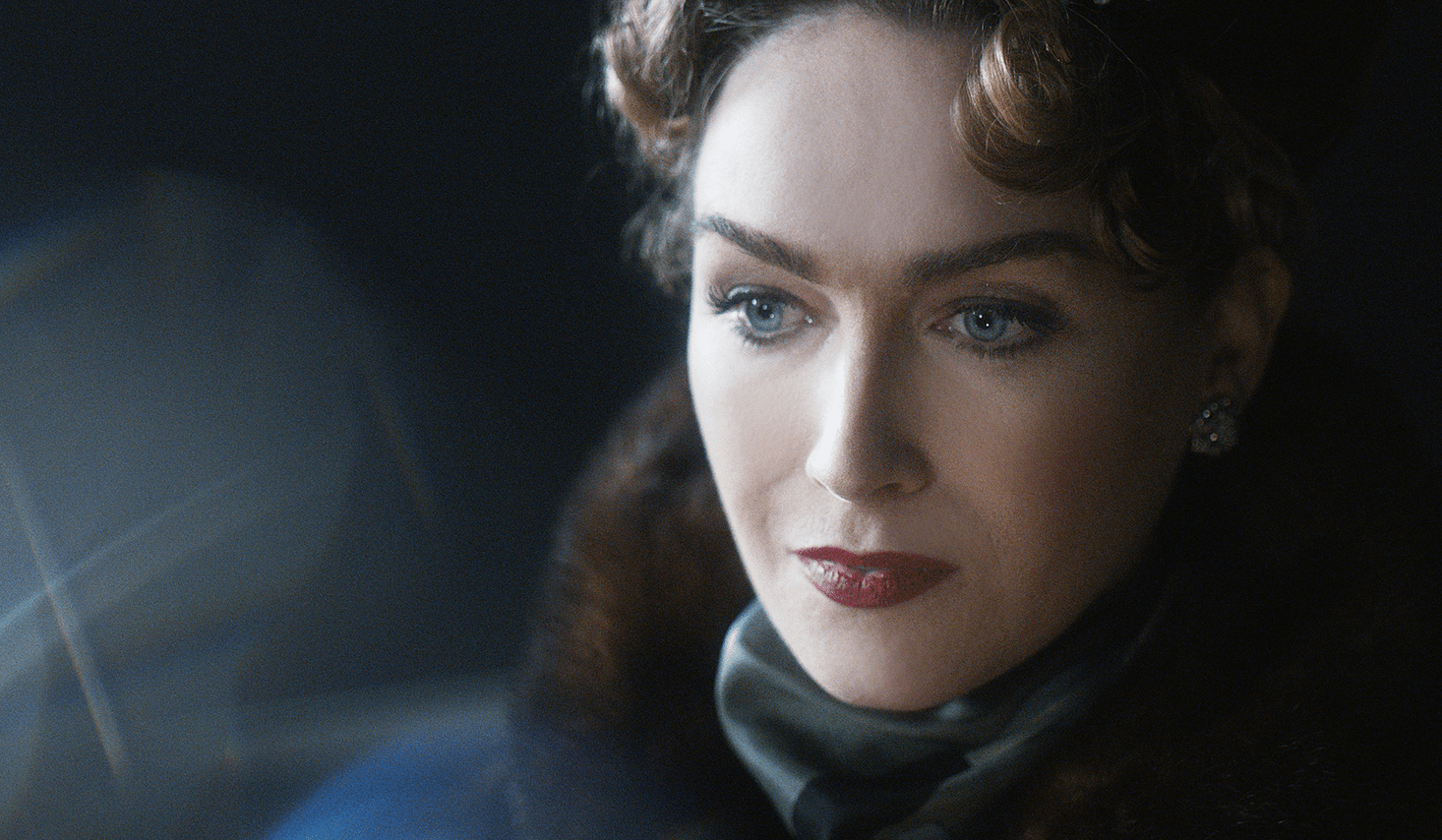
Ever since her role on Netflix’s beloved sci-fi drama Sense8, Jamie Clayton has kept busy with numerous roles in high profile television dramas. She tackled the world of political thrillers in Designated Survivor, joined the family of The L Word, and returned to sci-fi for the reboot of Roswell, New Mexico. Earlier this year, she appeared alongside trailblazers such as Laverne Cox, Angelica Ross and Chaz Bono for the critically-acclaimed documentary Disclosure, which explores Hollywood’s depiction of transgender people and the impact of their stories on transgender lives and American culture. Like we said, she’s been busy.
Now, Jamie is tackling reenactments in Equal, a four-part docuseries from HBO Max that chronicles landmark events and leaders in LGBTQ+ history. Jamie stars as “the world’s first transgender celebrity” Christine Jorgensen, who became an international queer icon following her gender confirmation surgery in the 50s. For Jamie, it’s important to show audiences – even queer audiences – that the LGBTQ+ rights movement didn’t start with the Stonewall Riots.
“I don’t know why our queer history is all based from Stonewall forward,” she tells GAY TIMES over Zoom. “It’s so important to tell these stories because it shows society at large, not just our community, but the cisgender community and the straight community, that we’ve been around for just as long as y’all have been around. We’re not going anywhere. We’ve been fighting. We didn’t just start fighting at Stonewall. We’ve been fighting for a really, really, really long time.”
Here, we speak with Jamie about her incredible role as Christine Jorgensen in Equal, how Sense8 impacted her career in the long-run and why any fictional character can be trans – even Monica Gellar.
How did you get involved with Equal?
They reached out and offered the part of Christine Jorgensen. I knew the name, Christine Jorgensen, just because she’s legendary in the community, but I didn’t know much about her. I did a deep dive on Google and watched videos that I found online. My manager and I talked about it, and we decided that it would be a really fun thing for me to do, so I jumped at the chance. There’s also this big disconnect with the trans community, I think with the younger generation, people don’t know about Christine Jorgensen and Renee Richards – people that came before and are the reason why I am able to do everything that I’m doing. It was a really big deal for me in more ways than I can express, to pay homage to her and help the public. The two other figures portrayed by Alexander Grey and Theo Germaine I had never heard of before. I felt really bad.
I don't know why our queer history is all based from Stonewall forward. Even with Stonewall, there's all this revisionist history, where there was a movie made where a white guy threw the brick. We don't even know how to tell our own stories correctly!
What do you think viewers will find out about Christine when they watch the episode?
I hope they learn about her and emphasise with her and her story, realise how important she was to the overall narrative of queer history. She’s such an integral part of that, especially for trans people. Christine is interesting because there’s so much press coverage, unlike others who have no actual archival footage, so I have a bit of competition within my reenactment. I hope people like it. I did my best. I listened to her interviews over and over. She put her body, her face and her soul on the line for the whole community by being a public figure and enduring brutal interview after interview after interview. She is a trooper.
A lot of people tend to think that the history of LGBTQ+ rights started with Stonewall. Why do you think this significant part of LGBTQ+ history has been neglected?
Stonewall was such a big deal, but it’s interesting because the Compton’s Cafeteria Riot happened before Stonewall. Hardly anybody that I know, they don’t even know what those are. The Compton’s Cafeteria Riot was such a big deal, and when I read the scripts for Equal, I was really happy to see that the narrative talks about that. Overall, the four episodes is all pre-Stonewall, because for some reason, I don’t know why our queer history is all based from Stonewall forward. Even with Stonewall, there’s all this revisionist history, where there was a movie made where a white guy threw the brick. We don’t even know how to tell our own stories correctly! Give me a break. I think the reason it’s so important to tell these stories is because it shows society at large, not just our community, but the cisgender community and the straight community, that we’ve been around for just as long as y’all have been around. We’re not going anywhere. We’ve been fighting. We didn’t just start fighting at Stonewall. We’ve been fighting for a really, really, really long time, just for the rights to walk down the street and hold the hand of the person that we love, and go to the doctor and not be discriminated against. We’ve been fighting this fight for a very long time.
It’s incredibly refreshing to see queer historical figures being played by queer people – was this something the production company mentioned before you were cast?
I never worked for Greg Berlanti, but I’ve auditioned for his production company and my manager has a lot of experience with other actors working with him. He is through and through, he walks the walk and he doesn’t just talk the talk. He’s an incredible person in that respect. When I saw that Jim Parsons was producing, I was like, ‘Okay, that’s really great.’ Then, when I found out that Kimberly Reed was directing, I was like, ‘Okay, so this is interesting. They’ve got a trans identified woman who is a documentary filmmaker, who’s directing.’ I love that, and they were reaching out to me with an offer, which felt very respectful at this point in my career. I thought, ‘They’re doing this right.’ So, I knew that I was going to be walking into an environment that was going to be extremely respectful, that they were going to be doing everything that everyone says they’re going to do, and then kind of does. After seeing a screener of the episode, I was completely floored. The editing, the music, the narration, the reenactments, everything. I can’t wait to see the other three. It’s honestly one of the best things that I’ve ever seen. I was completely blown away.
You’ve been in the industry for over a decade now – have you seen a shift in LGBTQ+ representation?
I’ve definitely seen a shift with more opportunities, although still extremely limited. I have seen more opportunity for actors who identify under the umbrella, whether that be trans or queer. I’ve definitely seen that shift. My fight has always been, and I’ve said this so many times but nobody ever wants to print it because they want the clickbait stuff, is that every actor should be able to play any kind of role. My issue is the opportunity, especially with actors who identify as trans, is that it’s not always there. I’ve got to a place in my career where I’ve had several offers come through such as Roswell, New Mexico, that came to me as an offer. I had auditioned for the first season for another character, and I didn’t book it, but I was in the room with the creator and she liked me so much. She made a note of how well I did in my audition, and then they came a year later and offered Charlie Cameron, which was really great. Charlie, the character, they told me that she is trans but it never comes up in the show. Designated Survivor, that came in as an offer, which felt really good, and then on The L Word, I’m not playing trans. The character wasn’t written as trans. The whole thing with trans characters and cis characters, the only difference between a trans character and a cis character is that cis characters aren’t bogged down in language and dialogue about their gender identity. So in actuality, on any show that you love, any character could be trans if you want them to be. It’s art and we all interpret art in different ways. I do think that there has been a shift and I’m out here, honestly, fighting for all of us. I understand that I have a lot of privilege. I look the way that I look, but I’ve been working my butt off, and I’m not booking the things that I’m booking because I have a pretty face. But if I can keep doing the work that I’m doing and looking for parts that are trans, that aren’t trans and all over the place, then I just think that that will carve out a path for the actors that are just starting out, or they don’t have as much experience as I do. It can carve out a path for them to start booking jobs. It’s about us getting in the room. I want casting directors, producers and directors, when a part comes up and somebody looks right for this, just give them an opportunity to audition. Trans people don’t have to just play trans, but that’s been the hard and fast rule for so long. Like, ‘Oh, we have a trans character now. Now we have to reach out and do like a big casting. We need a trans person.’ But why can’t we audition for everything? That’s my fight. That’s always been my fight, always. I’ve said this, but nobody ever wants to print it.
I didn’t know that Charlie Cameron was trans, and I love that because the storyline didn’t revolve around her hardships. She was just a badass, fake agent looking for her alien abducted sister.
Exactly. Then my fans who have been following my career, when they tune in to Roswell, they can make the decision for themselves. If they want my character to be trans because I am, then that’s great, Charlie Cameron is. For people who don’t know me, if they want me to be trans, I am, and if they don’t… I’m a huge fan of Friends, and to me, Monica is trans because she’s my favourite and I love her. I want Monica to be trans. It’s art. We all interpret art in different ways, and that’s the fun of it, it doesn’t have to be so rigid.
The only difference between a trans character and a cis character is that cis characters aren't bogged down in language and dialogue about their gender identity. So in actuality, on any show that you love, any character could be trans if you want them to be.
Speaking of fans, you garnered a huge following after Sense8 hit Netflix – how did the series affect your career?
That’s when everything started to take off. The thing with acting is, you don’t want to paint a painting and then have it sit in a basement. You want it to hang in a gallery. It’s like you said, I’ve been doing this for 10 years. I think I’d been doing acting for about six years when Sense8 came along, and the audition process was one of longest and most brutal. I went in, did a tape, met them in person and then did a chemistry test. It was a month-long process. After I booked it, none of us knew what was going to happen. The fact that it was successful and we got a second season, it was an incredible feeling. To this day, I still get messages from people saying they’ve just started watching it in self-isolation. A lot of people said they never watched the movie, because they didn’t want it to end, but they finally needed a pick me up and watched it. I’ve had so many people tell me that they came out to their families or friends after watching the show, and it’s just an incredible feeling. I had no idea as an actor what was going to happen, but it changed everything for me. After Sense8 finished, I didn’t work for a year, which was really funny because I almost needed the year off to sort of decompress from all of it. But then, Designated Survivor came and it was an offer. That felt really good. I got The L Word later and then Roswell came. Now, The L Word is going again and I’ve been bumped up on that. Then Equal came, and it’s so different. Sense8 changed everything in the sense that it was on a global stage, so to speak. It put me and my face and my talent in front of eyeballs. Projects that I had done before just didn’t have that kind of reach. I’m totally grateful to The Wachowskis, J. Michael Straczynski and Netflix and everyone for the opportunity, because Nomi Marks has a piece of my heart.
I’m sure you’ve been asked this on many occasions, but is there any chance for a reunion in the future?
Reboots are the hottest thing right now! I think you have to be gone a few more years to be considered a reboot. Even doing the movie, the scheduling, was a nightmare. Yeah, obviously I would. It would be really fun to come together over a Zoom or something. But, I’m really satisfied. Did you like the movie? I hope so!
Are you kidding? I loved it. The tears…
You’re so sweet. When they said that they were going to do the movie, I said one thing. I said, ‘Nomi and Amanita, they have to get married.’ I was like, ‘I’m not doing it unless they get married,’ and I was told, ‘Yes, they’re 100% getting married, we don’t know how or where but they’re getting married!’ I said, ‘Okay, I’ll do it.’ So I was really chuffed with the ending and I thought it was really good. But yeah, my answer is obviously a yes.
What other projects do you have in the works?
I will be back playing Tess on The L Word: Generation Q for season two. We just confirmed all of that, which is super great. Production starts soon, and I have also booked another series and I can’t say which one yet. I’m so sorry, I hate when actors do that! I have something else that I start filming in a couple of weeks, which I’m sure will be announced very soon. Yeah, I’m very grateful. I auditioned for this project in the beginning of the lockdown, not knowing what the hell was going to be going on with the world. Obviously, everything was put on hold, and so production is evolving. But I’m very grateful. I booked it! Yaaaas. A couple of things happening, I’m very grateful that I get to get back to work.
Equal is now available to stream on HBO Max.
